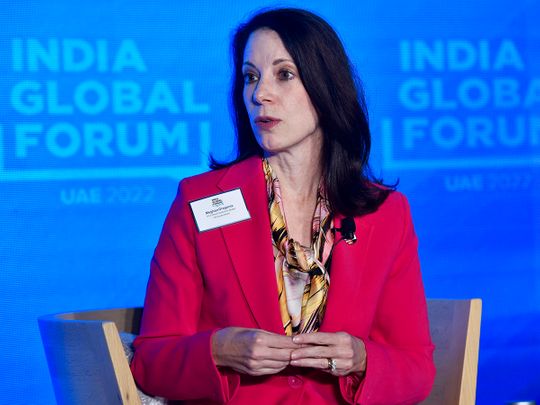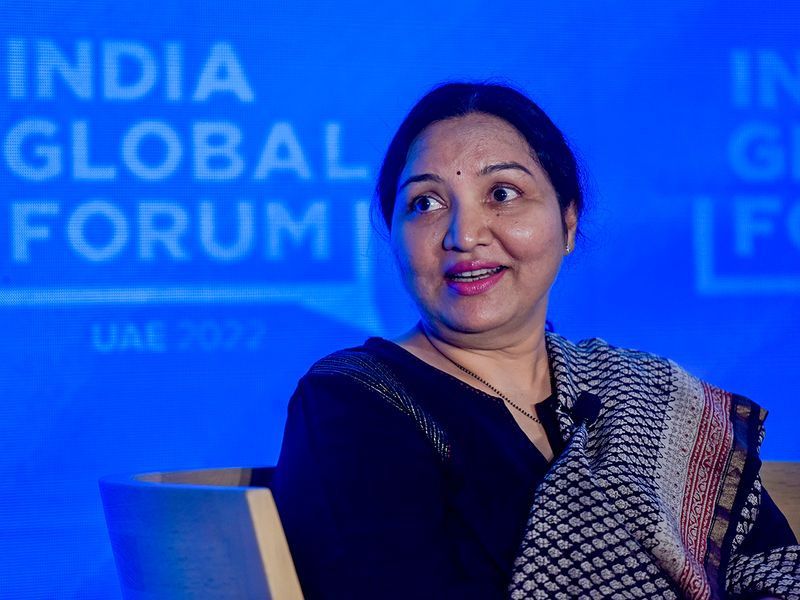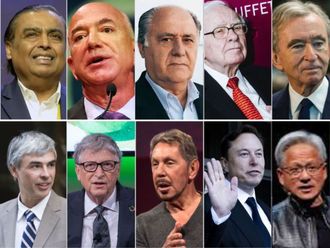
Dubai: The second edition of India Global Forum (IGF) UAE concluded on Thursday with sessions turning the spotlight on the role of women on the global stage. While an increasing number of women are today assuming leadership roles in government and private sectors, as well as helming successful businesses, speakers at the event agreed that a lot more needs to be done to bring about meaningful changes that will pave the way for real gender equality.
Setting the tone for the fourth and final day, Manoj Ladwa, Founder and CEO of IGF, said he found it “absolutely amazing” how women were able to juggle between household responsibilities and top-level conversations and conference calls at the highest levels of corporate or government sectors. He also said his vision for the future is a time when the need for sessions focusing on women’s empowerment does not exist.
Laura Buckwell, who moderated the day’s sessions, pointed out that although women leaders are as likely as men at their level to aspire to be promoted and put in senior-level roles, in many companies they are not advancing at the same rate. She quoted a study report that said women leaders are twice as likely to be mistaken for someone junior in the organisation and to feel that their characteristics, such as their gender, or being a parent, have played a role in them being denied or passed over for a raise, a promotion, or a chance to get ahead.
The second session saw Meghan Gregonis, Consul General of the United States of America in Dubai, discuss the challenges faced by women in leadership and senior management roles. Gregonis noted that even though there has been significant progress made in women’s representation in leadership roles, certain sectors like diplomacy are still heavily male dominated. Being the first female Consul General of the United States in Dubai, she highlighted the need for change and for new policies to ensure that there are more women in leadership roles at a global level.
She also praised the UAE for its progressive strides in terms of the representation of women in the economic sector and in leadership roles. Addressing the issue of unconscious bias, she said: “While it is normal to have it, it is important to recognise unconscious bias and to counter it.” Gregonis also stressed on the importance of mentorship in encouraging women to climb up the rungs. She said it is critical to have a collective effort from both men and women to recognise the potential of women at large, across industries and sectors.
The following session saw panellists highlighting the need for organisations to go beyond their commitments towards gender equality, and turn their plans into actual actions on the ground. They discussed existing constraints for women leaders and how they can overcome them, as well as the approach of organisations to handle gender equality better and the way forward. “I’d say that the mindsets are changing but they are not changing fast enough. Women leaders don’t need dole-outs; they need equality and equal opportunities. For me, the challenge is the broken rung in the middle. I have been to many conferences where people talk passionately about how they are hiring women at the bottom of the pyramid. That’s great. The issue is how they are nurturing the talent to grow from the broken rung,” said Harshvendra Soin, Chief People Officer, Tech Mahindra, India.
Agreeing to this view, Noha Hefny, Founder and CEO, People of Impact, said although there are a lot of leaders in the public and private sectors looking to step up their commitment towards gender equality, there needs to be more strategic integration, and more evidence-based approaches using data to measure progress on these actions. “I haven’t seen organisations going beyond initial commitment,” she said.

Dr Supriya Kummamuru, CTO Middle East and South Africa, Tata Consultancy Services (TCS), UAE, said cultural and geographical constraints play a role in women not achieving their potential. “What is gender-agnostic is your intelligence, qualifications, capabilities and to realise the roles. But if you consider females, there are a lot more diversity quotients to it. It starts with age, marital status and career stage, your looks and your attitude. All these (issues) which were of great concern three decades back, have blurred now, thanks to different work patterns. There are opportunities now,” she added.
Meanwhile, Jiten Vyas, Chief Commercial Officer and Member, Executive Board, VFS, said the last 7-10 years have seen greater awareness on women’s issues and also on gender equality, with the positive advent of social media. “We should start from the bottom up,” he said.
“We need to make the change at homes, colleges and schools. It’s not about a particular country or culture. We have a mindset problem. That’s a difficult challenge in today’s scenario but it’s changing,” added Tech Mahindra’s Soin.
In a later session, Darshita Gillies, Founder and CEO, Maanch, UK, highlighted risks and stereotypes and challenges associated with starting up businesses and gathering funding for women entrepreneurs. The session shed light on how men and women entrepreneurs face vastly different constraints including psychological and cultural biases.












